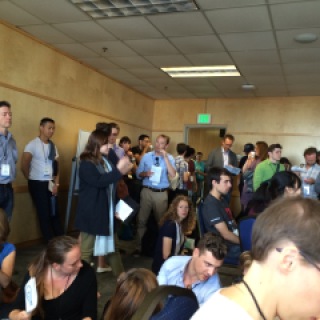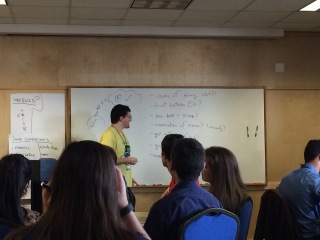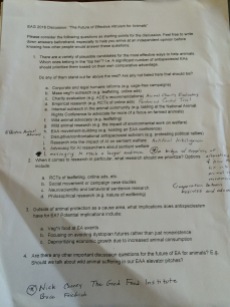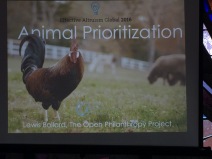“Let’s go out there and do a f*** ton of good!” was the closing sentence of Will MacAskill at the Effective Altruism Global 2016 conference held at UC Berkeley August 5th through 7th this year. Professor MacAskill is the youngest tenured professor of philosophy in the world (yes, in the world, at age 29) and is the co-founder of Giving What We Can, author of Doing Good Better, and a major voice in the Effective Altruism movement. As one might hope at a conference of altruists, the book was free!

I only heard about the conference and the movement itself the day before the conference, when I met Tobias Leenaert, The Vegan Strategist, when I went to a talk he gave at the newly opened Berkeley Animal Rights Center.

One online application submitted and there I was, at the Effective Global 2016 conference with about 1,000 other altruists.



After making my way through registration, and grabbing a coffee (altruists need coffee too!), I went to my first session, How to Change Your Mind, presented by Miya Perry, Head of Training for the Oakland start-up Paradigm Academy. We learned about changing our behaviors by digging deep into our System 1 and System 2 beliefs (I found this description helpful).
Next up: Cooperative Conversations, led by Tsvi Benson-Tilsen, formerly of the UC Berkeley Math Department and now at the University of Chicago. Conversation is more complicated than you think. We all operate from different world models of knowns, “known unknowns” and “unknown unknowns”, and our models may or may not overlap.
Et voilà, it was time to check out dinner! Being altruistic can work up an appetite. The food was delicious and predominantly vegan, with a couple of vegetarian alternatives for those who must have cheese (I understand, I really do). Vegan as the default was such a great way to go! Thank you, Centre for Effective Altruism, for that decision as well as the compostable bamboo plates and forks.
And of course, you know I wouldn’t leave out the all important dessert!
Saturday started with the keynote talk, The Past, Present, and Future of Effective Altruism, by Will MacAskill and Giving What We Can co-founder Toby Ord. (Note: a side benefit was getting to hear all of the wonderful accents and languages from this international community. Will is Scottish and Toby is Australian, though both are now at Oxford in England.)

Toby presented about the past, going through the history of ideas, while Will spoke about the present expansions in the EA literature, EA groups, and outreach.


Tired yet? It’s early still! Let’s grab a coffee and keep moving.

Away we go, to The Future of EA for Animals, presented by Jacy Reese from Animal Charity Evaluators. It was a quite lively discussion about the most effective ways to help animals
Time for lunch. The lunch buffet was set up on the plaza in front of Zellerbach Hall. In addition to good food, lots of small groups formed to continue the conversations that the various sessions (of which I went to only a handful) so far had triggered.
While a nap might have been a good thing about now, I soldiered on to Are Scientists Responsible Enough?, a talk given from the UK via the magic of Skype by astrophysicist Lord Martin Rees for the Centre for the Study of Existential Risks. As Lord Rees says (paraphrasing), because of the huge implications of the possible actions by a few people, we need more conerned and socially engaged scientists. As he said, “the global village has its village idiot with a global range”. In the US, his book is sold under the title Our Final Hour.
Back to my favorite topic–animals–with Irene Pepperberg from Harvard, talking on Avian Cognition and Consciousness: The Gray Parrot and Its Implications for Animal Welfare. We share this world with many other creatures and we are all interconnected. Empathy is called for, and we are only just finding out how much we don’t know about non-human animal intelligence.
Next, I went to a workshop on how to prioritize and compare different interventions for helping non-human animals, run by Lewis Bollard from Open Philanthropy Project.
Still holding up okay? Me too!

If we want to make the world a better place, of course, humans are a big part of the picture. The next session I chose was The End of Poverty, a lofty goal.
Utilitarian philsopher Peter Singer, author of many influential books (Animal Liberation, Darwinian Left, and, relevent to this presentation, The Life You Can Save: How to Play Your Part in Ending World Poverty) was able to participate in a question and answer session with the audience through Skype.
His ending message: don’t think in terms of sacrifice but of fulfillment in your efforts to make the world a better place. As the saying goes, the life you save may be your own.
This was followed by a panel discussion moderated by Rajesh Mirchandani from the Center for Global Development.


When evaluating possible interventions, some of the things to consider: scale, evidence/data, incentives, accountability, and transparency.
Catch your breath, and now we move on the day 3, which I started with a round of 3 20-minute talks. These were in the Senate Chambers for the Associated Students and Graduate assembly at UC Berkeley, on the 5th floor of Eshleman Hall. Very spiffy, and great views.
First up, Tobias Leenaert on Helping Animals with Technology or Morality? It takes a lot of motivation to get people to change their habits for ethical reasons. Maybe the vegan movement should focus on getting people to eat meat alternatives as they become more readily available (just try them, they’re [mostly] delicious!), and then their attitudes toward animals will shift as a result. In other words, instead of trying to change people’s beliefs to change their behavior, change their behavior and the attitude shift will follow. I will say that I am creeped out by lab meat, aka, clean meat, cultured meat, and tissue-engineered meat. But I am not a meat lover and my attitude is already with the animals!

Tobias was followed by Adriano Mannino of Effective Altruism Foundation on Affecting the Far Future with the Animal Cause. The foundation is an anti-speciesist think tank and project incubator headquartered in Germany. His point, if I understood correctly, is that people who value the lives of animals and want to prevent animal suffering are of a mind-set that also predisposes them to take on other causes and value all things living, human, non-human animals, plants, the planet, and that we can build toward a better future for all utilizing those values.
Finally, the round of speakers ended with nanotechnologist and futurist Christine Peterson, co-founder of Foresight Institute on Upstream Altruism: Applying EA Principles to Early-Stage Action.
My favorite bit was the idea of “hit and run” altruism, which could be equated to random acts of kindness. Nanotechnology means nothing to me, kindness does.
We aren’t done with lab-grown meat yet! Back to Zellerbach Hall for a panel discussion, Rethinking Meat and the End of Factory Farming, moderated by Claire Zabel with Open Philanthropy.

For more information on the panelists:
I met Allison Smith again at the workshop on interventions, led by Allsion and Jacy from Animal Charity Evaluators.
I promise this is the last on lab-grown meat; panelists Uma Valeti of Memphis Meats, Oliver Zahn of Impossible Foods, Tim Geistlinger from Muufri, and Isha Datar from New Harvest answered audience questions about technology, nutrition, and the notion of cellular agriculture. I’m still sticking with plant-based, thanks.

We’re almost done! Yes, I’m getting tired too.

I couldn’t leave without going to the talk by Cass Sunstein, who I know as the editor of texts I’ve used in animal protection classes in my humane education program. He has other claims to fame: Harvard Law professor, legal scholar, Administrator of the White House Office of Information and Regulatory Affairs in the Obama administration from 2009 to 2012, and author of many books, including The World According to Star Wars (surprised by that one?!).

Professor Sunstein’s talk was titled From Behavioral Economics to Public Policy. Don’t let the title scare you. Many Star Wars references were sprinkled throughout (I won’t pretend to have understood most of them).

It was a very interesting talk on social meaning and concepts like using nudges to get people to do good things. For example, at the Amsterdam International Airport, flies painted in the urinals nudge men to aim at a spot where pee doesn’t overflow onto the floors. These have resulted in 44% less “spillage” in the men’s bathrooms at the airport. Don’t ask me how it was measured. Or who had to measure it.

And now to the closing remarks!

A gathering on stage of the staff of the Centre for Effective Altruism who made the conference happen, the awesome volunteers, and a big thank you to them and to all of us for attending and spreading the ideals of effective altruism.

And proving that we are also optimists, all of us went outside to gather for a group photo, I haven’t seen the final result, but here we are trying to squeeze together in front of Sproul Hall.
I’d like to end this with one last thought. The weekend before this, I attended the World Vegan Summit 2016 in the same location. I thought I would have a lot to write about, but I had an uncomfortable feeling the whole time (compounded by food poisoning; gotta wash those fruits and veggies and use clean hands, food service people!). It was an amazing opportunity to hear Professor Gary Francione, a divisive but forceful leader in the animal rights movement, and I learned alot. But there was a vibe of “our way is the only way” that doesn’t sit well with me. I am much more interested in open-minded thought and discussions.
Peace. And may the force be with you.




































































